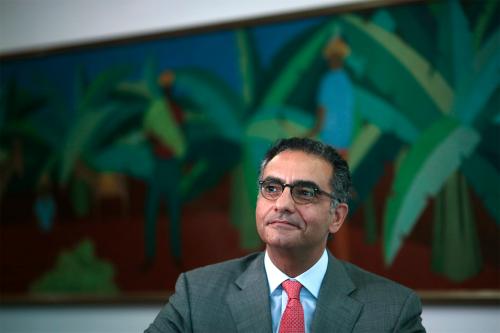By the end of this month, both the United States and the world at large will reach an important internet milestone—the handoff of American oversight of the Internet Assigned Numbers Authority (IANA) functions that are needed to maintain the internet’s Domain Name System (DNS). IANA functions are a set of interdependent technical functions that enable the ongoing efficient operation of the internet. They include the coordination of the assignment of technical internet protocol parameters and the allocation of internet numbering resources. The DNS is a critical component of the internet’s global infrastructure. It allows users to identify websites, mail servers, and other internet destinations using easy-to-understand names (e.g., brookings-edu-2023.go-vip.net) instead of numeric network addresses (e.g., 170.110.226.153) in order to retrieve information on the internet. In effect, DNS functions as an “address book” of the internet.
The National Telecommunications and Information Administration (NTIA) of the U.S. Department of Commerce was granted authority over IANA in 1988. Since 1998, NTIA has contracted management of IANA functions with the Internet Corporation for Assigned Names and Numbers (ICANN), a non-profit organization established for this purpose. Based on a comprehensive multi-stakeholder planning process over the past 2 ½ years, NTIA has agreed to let its existing contractual relationship with ICANN expire at midnight on September 30, 2016. This means that the United States will cease being the sole government with any legal authority over ICANN.
The orderly transition has been expected for quite a while, but as the final deadline looms, there is considerable discussion in political circles whether Congress should intervene in the waning days of the NTIA contract to delay–or even prohibit–this transition from taking place. The arguments opposing the transfer of authority are largely philosophical and symbolic, rooted in the notion of general American exceptionalism and a recognition of the undisputed leadership role of the United States in fostering internet development around the world.
Today, 3.4 billion of people around the world are connected to the internet—roughly half of our global population. And by 2021, the telecommunications company Ericsson projects that 28 billion devices will connect to the internet. For those who view internet development as a strategic economic and national security asset, the symbolism of having some residual U.S. government involvement represents an American safety net that should not be eliminated. In more colloquial terms, this translates into, “If it’s not broken, don’t fix it.”
Such a viewpoint is easy to communicate, thus capable of garnering headlines, generating press conferences and hearings, and perhaps even stirring up some constituent support in Congressional districts and states.
But these rumblings overlook how methodical the transition process has been, culminating in the IANA Stewardship Transition Proposal Implementation Planning Status Report released by ICANN last month. This report indicates that NTIA, along with other U.S. government agencies, conducted a thorough review of ICANN’s proposals to replace the historic NTIA stewardship relationship and establish enhanced ICANN accountability mechanisms that could be effectively implemented.
In short, any lingering debate on the merits of this internet governance transition needs to focus on the findings that NTIA has made regarding ICANN’s proposal. Several preconditions for approval have been met, according to the U.S. review that was undertaken under NTIA’s leadership. The transition proposal:
- Reflects a multistakeholder process that engaged internet stakeholders around the world, building on existing multistakeholder arrangements, processes and concepts.
- Maintains the security, stability, and resiliency of the internet DNS because it is based on ICANN’s effective operational practices to perform IANA functions.
- Bolsters the ability of internet stakeholders to ensure ongoing security, stability and resiliency.
- Meets the needs and expectations of the global customers and partners of IANA services, since it was directly created by those customers and partners.
Perhaps of greatest importance, NTIA concluded that the transition will maintain the openness of the internet because it requires that IANA functions, databases, operations, and related policymaking remain fully open and accessible, just as they are today.
Legislative intervention still may be pursued with so little time left, but the burden of proof on why these conclusions are incorrect should now be shifted to those who assert that the U.S. is acting hastily or irresponsibly in making this rational change.
The Brookings Institution is committed to quality, independence, and impact.
We are supported by a diverse array of funders. In line with our values and policies, each Brookings publication represents the sole views of its author(s).







Commentary
Why the new internet governance system should proceed quickly
September 19, 2016